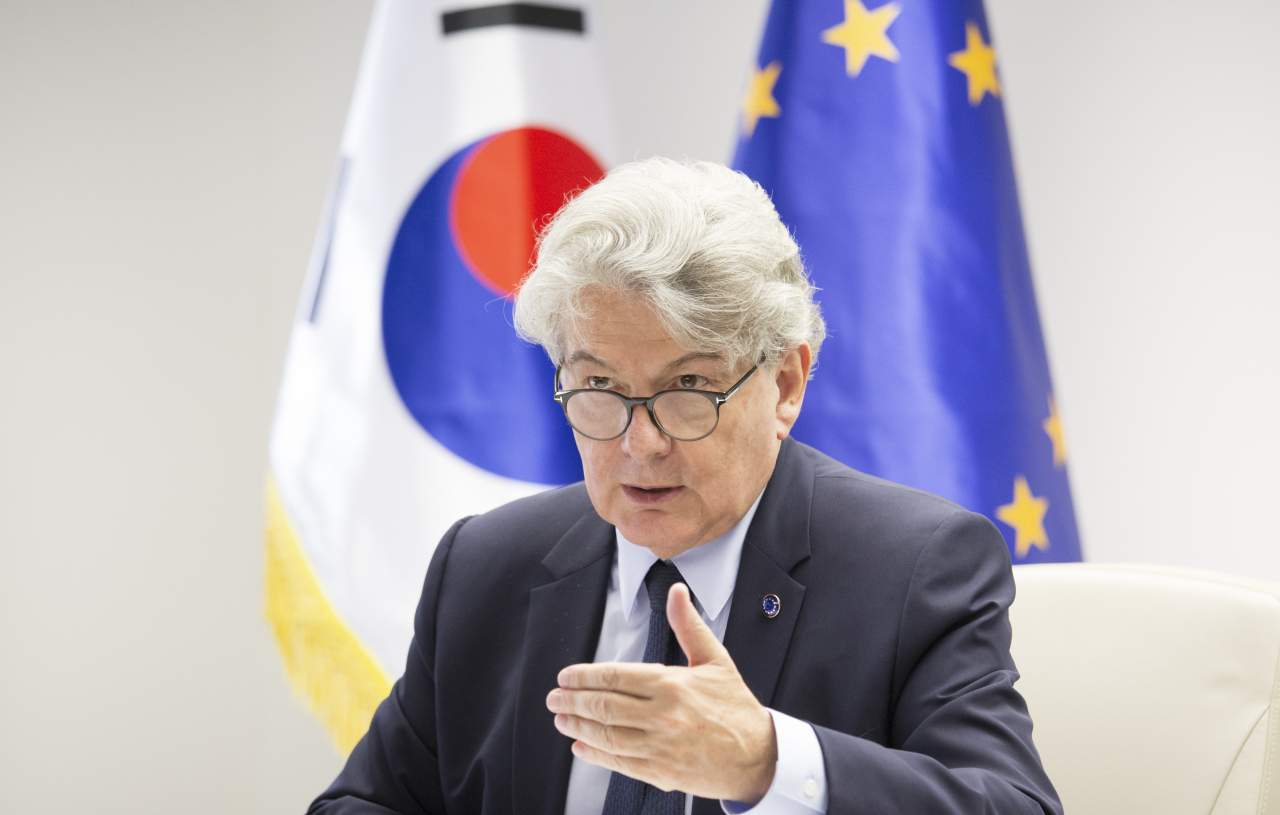[Herald Interview] EU seeks cooperation with South Korea to de-risk from China amid supply chain woes
EU commissioner discusses chip investment with Samsung chief
By Jo He-rimPublished : July 4, 2023 - 12:01

The European Union is keen on cooperating with South Korea in chips, digital trade and clean technology, the European Commissioner for Internal Market Thierry Breton said Friday, amid mounting geopolitical uncertainties.
"It is important that like-minded partners cooperate by coordinating policies, align on issues related to economic security and discuss trade-distorting practices, not only to ensure a level global playing field, but also to guarantee that supply chains are resilient to external shocks," Breton told The Korea Herald in a joint interview in Seoul on Friday.
"Diversifying sources of supplies through international cooperation is vital to 'de-risk,' rather than 'decouple,' supply chains. South Korea is one of the EU’s key allies in this regard."
On an official two-day visit to Seoul starting Thursday, Breton met with South Korea's top government officials including trade and science ministers, and business leaders to discuss ways to deepen cooperation and explain the necessity of "de-risking" supply chains.
Breton said he also met with Samsung Electronics Chairman Lee Jae-yong to discuss the world’s largest memory chipmaker’s further investment in Europe.
"With the EU Chips Act, Europe has put in place an attractive environment for investment in semiconductors and we expect to attract investment from Korean companies," the commissioner said.
"I discussed this with the chairman of Samsung Electronics ... who already has a strong presence in Europe."
Amid the intensifying competition among chip powerhouses in introducing industry boost programs, the EU also announced its own Chips Act, offering more than 43 billion euros of subsidies to double its global market share in chips to 20 percent by 2030.
"To be very open, we have important semiconductor companies in Europe that could be interested in partnering with Korean companies, for example in a new venture for the creation of an advanced EU semiconductor fab," Breton said.
He added that Korean companies could benefit from expanding their research and development activities in Europe, as the Chips Act includes financial support for design centers.
During the interview, the commissioner also dispelled concerns among Korean businesses that Europe's Critical Raw Material Act and Carbon Border Adjustment Mechanism are "not protectionist."
Explaining that the nature of CRMA lies in the diversification of supply chains, Breton said that the demand for critical raw materials is likely to increase so much that in absolute terms, meeting the benchmarks "does not mean reducing imports to the EU either globally or from any particular country.”
Being heavily reliant on China for its supply of raw materials, the EU announced the CRMA which aims to reduce its dependency by limiting its import of raw materials to account for no more than 65 percent of its annual consumption from a single third country by 2030.
The CBAM policy, designed to ensure an equivalent carbon price be paid by domestic and imported products, is also "non-discriminatory," the commissioner said. He added that the EU has introduced an almost 3-year pilot phase, until January 2026, "to give maximum predictability for investors and businesses and the EU and outside."
"While we support global efforts to accelerate the green transition and climate change objectives, competition must be fair and respect the level-playing field," Breton said.
"We need to avoid a subsidy race as this could potentially encourage a race to the bottom and damage international trade. It is imperative that like-minded countries work together to make sure countries do not needlessly compete unfairly against each other and ensure that our respective policies are mutually reinforcing."
At the same time, Breton stressed that China is an important commercial partner for Europe, that its intention is “not at all to decouple from China,” but to “de-risk,” meaning to reduce the risk conflict with China may pose for supply chains. He said he shared this common objective with South Korean Trade Minister Ahn Duk-geun.
“China is and will continue to be an important commercial partner. In the previous commissions of six or seven years, we called China a systemic rival, but it’s also a very important commercial partner,” Breton said.
Traveling to Seoul to co-chair the very first Ministerial Council meeting in regards to the Digital Partnership South Korea and the EU forged in November 2022, Breton also highlighted the importance of setting digital trade disciplines.
Having obtained the authorization to open negotiations on digital trade with South Korea this week, the EU "aims to arrange digital trade disciplines that would create opportunities for businesses, and at the same time preserve its respective policy spaces in the digital sector," Breton said.
"In particular, the introduction of data protection safeguards, including with respect to cross-border data transfers, is a pivotal element for enhancing trust of consumers and businesses participating in the digital economy."
In this year's council meeting, the two sides also reaffirmed their commitment to set standards in a series of tech sectors, including chips, 6G, artificial intelligence and high performance computing.
On supply chain resilience, EU and South Korea agreed to change the name of their Industrial Policy Dialogue to "Supply Chains and Industry Policy Dialogue, and hold the event later this year.
The two sides have also decided to launch a cybersecurity dialogue, similar to one the EU has with the United States, and a quantum experts working group.




![[KH Explains] No more 'Michael' at Kakao Games](http://res.heraldm.com/phpwas/restmb_idxmake.php?idx=644&simg=/content/image/2024/04/28/20240428050183_0.jpg&u=20240428180321)













![[Herald Interview] Mistakes turn into blessings in street performance, director says](http://res.heraldm.com/phpwas/restmb_idxmake.php?idx=652&simg=/content/image/2024/04/28/20240428050150_0.jpg&u=20240428174656)
